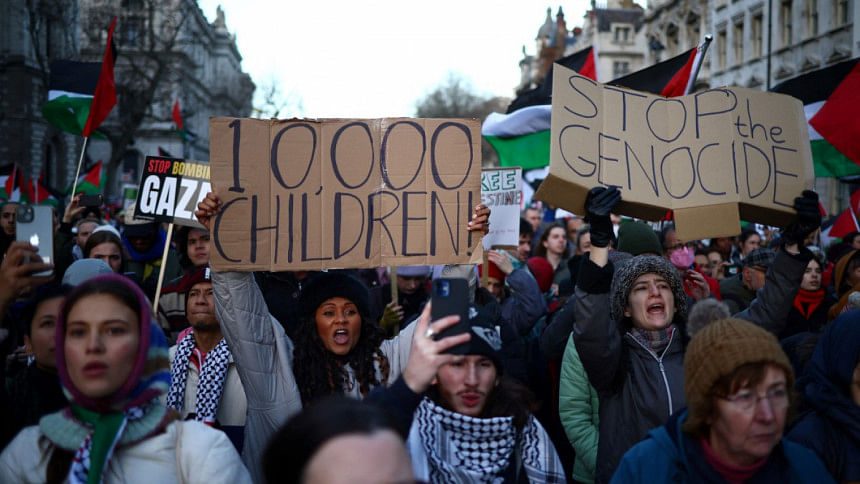Israel came under pressure Wednesday from its allies over its war in Gaza, with key backer the United States criticising its bombing in response to the October 7 attacks as "indiscriminate".
The United Nations General Assembly also overwhelmingly backed a non-binding resolution demanding an immediate humanitarian ceasefire in the devastated territory.
The war began after Hamas militants launched an unprecedented attack on Israel on October 7 that killed around 1,200 people, mostly civilians, and saw around 240 hostages taken, according to Israeli authorities.
Vowing to destroy Hamas and to bring the hostages home, Israel launched a withering offensive on Gaza, which is ruled by the militant group.
According to the Hamas-run health ministry, the war has killed more than 18,400 people, mostly women and children.
The ministry reported Wednesday that at least another 50 people were killed in the latest wave of Israeli air strikes across the territory.
Biden told a campaign event in Washington that Israel had "most of the world supporting it" after the Hamas attack.
"But they`re starting to lose that support by the indiscriminate bombing that takes place," he said.
Speaking later Tuesday at a news conference, Biden toned down his comments.
Reiterating the United States` support for Israel, he said that "the safety of innocent Palestinians is still of great concern".
Washington has been calling for weeks for Israel to take more care to avoid civilian casualties in Gaza, saying that too many Palestinians have been killed.
Israeli Prime Minister Benjamin Netanyahu also said there was "disagreement" with Biden over how a post-conflict Gaza would be governed, reflecting a rare rift between the allies.
And the leaders of Australia, Canada and New Zealand -- other Israel allies -- called for a ceasefire, issuing a rare joint statement to say they were "alarmed at the diminishing safe space for civilians in Gaza".
Their statement came after the UN General Assembly passed a resolution Tuesday demanding a ceasefire, with an overwhelming 153 member nations of 193 voting in favour.
While the United States and Israel voted against the resolution, Australia, Canada, New Zealand all voted in favour.
In total, the number of countries that voted for a ceasefire exceeded the 140 or so that have routinely backed resolutions condemning Russia for its invasion of Ukraine.
- `Hell on earth` -
The vote came as the head of the UN agency for Palestinian refugees Philippe Lazzarini described the situation in Gaza as "hell on earth".
"Back in #Gaza, endless deepening tragedy. People are everywhere, live in the street, need everything. They plead for safety & for an end to this hell on earth," Lazzarini posted on X at the end of a visit to the territory.
In Gaza City, Hamas said via Telegram that Israeli forces raided a hospital and detained its director.
The army did not immediately comment, but Israel has repeatedly accused Hamas of using hospitals, schools, mosques and tunnels beneath them as military bases -- claims it has denied.
The World Health Organization`s chief Tedros Adhanom Ghebreyesus said on X he was "extremely worried" by reports of the raid, adding that his agency "urgently calls for the protection of all persons inside the hospital".
Earlier the UN humanitarian agency OCHA had said fighting had been reported near the hospital for three consecutive days.
It also said two mothers were killed in a strike on the maternity ward, and that about 3,000 displaced people were trapped in the facility.
Israel`s air and ground campaign has reduced much of Gaza to rubble.
The United Nations said its satellite analysis agency UNOSAT had determined, based on a November 26 image, that 18 percent of Gaza`s infrastructure had been destroyed.
On the ground, fighting between Israeli troops and Hamas militants raged and rocket fire from Gaza into Israel continued.
Israel`s military announced that eight soldiers had died Tuesday in Gaza, adding to an overall toll of more than 100 troops killed since the start of the offensive.
- Children and parents mourn -
The UN estimates 1.9 million of Gaza`s 2.4 million people have been displaced by the conflict, half of them children.
Aid groups have warned the territory will soon be overwhelmed by starvation and disease, and are pleading with Israel to boost efforts to protect civilians.
"The spread of diseases in Gaza has reportedly intensified, especially due to overcrowded living conditions; which adds to the strain on an increasingly overwhelmed health system and an increased risk of people dying," OCHA said in its latest update.
It also said many people were missing under the rubble of destroyed buildings, waiting for rescue or recovery.
Israeli air strikes Tuesday killed at least 24 people in the southern city of Rafah, where tens of thousands are seeking shelter, according to the Hamas-run health ministry.
At Rafah hospital, bereaved father Hani Abu Jamaa cradled the body of his young daughter Sidal, who was killed by shrapnel.
He said there had been strong explosions overnight and he only found she was dead when he tried to wake her in the morning.
"Even if I live 100 years, I will never find another like her," he said, crying. "May God have mercy on her, oh Lord."
In Khan Yunis, southern Gaza`s largest city, a family gathered to mourn the death in a strike of Fayez al-Taramsi, father of seven.
"How are we going to live after him? He brought us to life," one of his daughters said, crying and clutching his bloodied shirt as the sole reminder of her father.
Fears of a wider conflict continued to grow, with Iran-backed groups targeting US and allied forces in Iraq and Syria, and daily exchanges of fire along Israel`s border with Lebanon.
The Israeli army said projectiles had been fired from Lebanon and Syria on Tuesday and it had retaliated by striking launch sites.




-20260304091720.webp)



-20260303080739.webp)
-20260302065048.webp)

















-20260225072312.webp)





-20260228064648.jpg)
